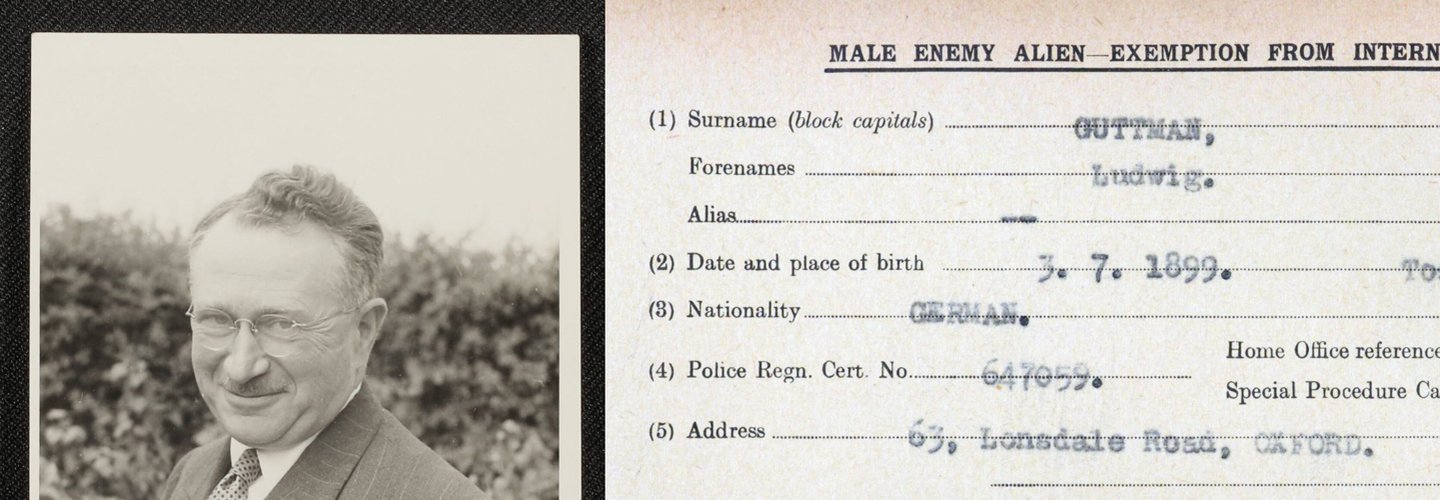Early life and escaping Germany
Ludwig Guttmann (1899–1980) was born in Germany in 1899 and grew up in the city of Königshütte, today Chorzów, Poland. In 1918, he began a medical degree at the University of Breslau, graduating as a neurologist in 1924. Working in Germany, he became a renowned surgeon specialising in spinal injuries.
However, as a German-Jew he faced persecution when the Nazis came to power. He was forced to move to a Jewish-only hospital in 1933, following the Nuremberg Law, which restricted his ability to work. In 1939, he and his family were able to flee Germany and safely come to the UK.
Records at The National Archives, beginning with his arrival to the UK, provide details about Ludwig's life here and shed light on his pioneering use of sport as rehabilitation.
A refugee in the UK
During the Second World War, internment camps were set up across the UK to hold enemy aliens – civilians who were believed to be a potential threat and have sympathy with the enemy’s war objectives. Coming from Germany, Ludwig would have been flagged.
However, this index card, from the Aliens Department record series, documents that Guttmann was given 'full exemption' from internment. Living in Oxford in October 1939 and working at the Radcliffe Infirmary, his occupation was listed as a physician carrying out research work.
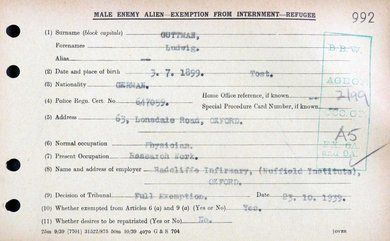
Partial transcript
MALE ENEMY ALIEN EXEMPTION FROM INTERMENT REFUGEE
(1) Surname (block capitals): GUTTMAN,
Forenames: Ludwig.
Alias:
(2) Date and place of birth: 3.7.1899. Tost.
(3) Nationality: GERMAN...
(5) Address: 63. Lonsdale Road, Oxford.
(6) Normal occupation: Physician.
(7) Present Occupation: Research Work.
(8) Name and address of employer: Radcliffe Infirmary (Nuffield Institute), Oxford.
(9) Decision of Tribunal: Full Exception.
Date: 23.10.1939.
MALE ENEMY ALIEN EXEMPTION FROM INTERMENT REFUGEE
(1) Surname (block capitals): GUTTMAN,
Forenames: Ludwig.
Alias:
(2) Date and place of birth: 3.7.1899. Tost.
(3) Nationality: GERMAN...
(5) Address: 63. Lonsdale Road, Oxford.
(6) Normal occupation: Physician.
(7) Present Occupation: Research Work.
(8) Name and address of employer: Radcliffe Infirmary (Nuffield Institute), Oxford.
(9) Decision of Tribunal: Full Exception.
Date: 23.10.1939.
Male Enemy Alien Exception From Internment – Refugee card for Ludwig Guttmann. Catalogue reference: HO 396/31/411.
The National Archives also holds a Passenger List for Guttmann, showing he entered the UK on 29 December 1938 from Lisbon, on a boat that originated in Buenos Aires.
Other records point to his time spent in Oxford. In the 1939 Register, taken on 29 September 1939, Ludwig and family are listed as living on 63 Lonsdale Road in Oxford, where it was noted that he was carrying out neuro-surgical work.
The inception of the Stoke Mandeville Spinal Unit
In the 1940s spinal injuries severely impacted a person’s life and, in many cases, resulted in death due to the development of bed sores. With the increase of injured service-personnel during the Second World War the British government invited Guttmann to set up a specialist spinal unit.
The National Spinal Injuries Centre at the Emergency Medical Services Hospital at Stoke Mandeville, Buckinghamshire was opened in 1944, staffed by Guttmann, two nurses and eight orderlies.
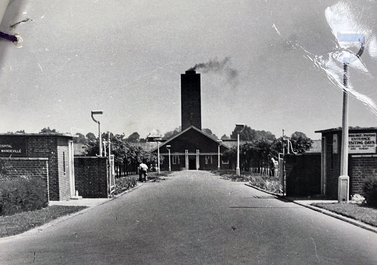
Photograph of Stoke Mandeville Hospital, 1952. Catalogue reference: MH 120/20.
It was here that he introduced sport as a means to help patients, challenging contemporary approaches to treating spinal injuries. Guttmann’s philosophy was that physical movement was paramount to rehabilitation. He encouraged his patients to undertake sport.
Guttmann's approach
A visit from the Ministry of Labour and National Service, on 25 October 1948, gives us insight into Guttmann’s approach. A report of the visit details:
'He is obviously a skilled specialist, with a broad outlook, doing magnificent work, determined to get his patients back to a self-supporting life. On the medical rehabilitation side I think the Ministry of Pensions has the right to feel proud of this hospital.'
Notes on a visit by the government to Stoke Mandeville Hospital.
Part of the afternoon was spent in the gymnasium where:
'There were excellent demonstrations including basket ball and badminton by the women. Dr. Guttmann has also introduced archery as he finds it excellent for developing muscles.'
Notes on a visit by the government to Stoke Mandeville Hospital.
Workshops to prepare patients for resettlement into productive economic work were also part of the hospital’s treatment regime. However, comments about setting up patients for work were not as positive: 'I wish I could say the same thing about the industrial resettlement side… a great amount of "welfare" but very little skilled resettlement.'
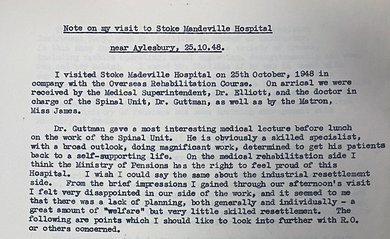
Transcript
Note on my visit to Stoke Mandeville Hospital
Near Aylesbury, 25.10.48.
I visited Stoke Madeville Hospital on 25th October, 1948 in company with the Overseas Rehabilitation Course. On arrival we were received by the Medical Superintendent, Dr. Elliot, and the doctor in charge of the Spinal Unit, Dr. Guttman, as well as the Matron, Miss James.
Dr. Guttman gave a most interesting medical lecture before lunch on the work of the Spinal Unit. He is obviously a skilled specialist, with a broad outlook, doing magnificent work, determined to get his patients back to a self-supporting life. On the medical rehabilitation side I think the Ministry of Pensions has the right to feel proud of this hospital. I wish I could say the same about the industrial resettlement side. From the brief impressions I gained through our afternoon's visit I felt very disappointed in our side of the work, and it seemed to me that there was a lack of planning, both generally and individually – a great amount of "welfare" but very little skilled resettlement. The following are points which I should like to look into further with R.O. or others concerned.
Note on my visit to Stoke Mandeville Hospital
Near Aylesbury, 25.10.48.
I visited Stoke Madeville Hospital on 25th October, 1948 in company with the Overseas Rehabilitation Course. On arrival we were received by the Medical Superintendent, Dr. Elliot, and the doctor in charge of the Spinal Unit, Dr. Guttman, as well as the Matron, Miss James.
Dr. Guttman gave a most interesting medical lecture before lunch on the work of the Spinal Unit. He is obviously a skilled specialist, with a broad outlook, doing magnificent work, determined to get his patients back to a self-supporting life. On the medical rehabilitation side I think the Ministry of Pensions has the right to feel proud of this hospital. I wish I could say the same about the industrial resettlement side. From the brief impressions I gained through our afternoon's visit I felt very disappointed in our side of the work, and it seemed to me that there was a lack of planning, both generally and individually – a great amount of "welfare" but very little skilled resettlement. The following are points which I should like to look into further with R.O. or others concerned.
Notes on a visit by the government to Stoke Mandeville Hospital, 25 October 1948. Catalogue reference: LAB 18/469.
Another file, from November 1949, details the treatment of patients when they first arrive to the hospital, where treatment is confined to 'healing sores and correcting the function of various organs…'
The next stage was to:
'convince the patient that his condition can be much improved and he will once again be able to look on life from a different angle and may, in fact, be able to take his place in the industrial field either from his home or with an employer. To achieve this end, the patient is trained to sit up and in time use a wheelchair. Once this is achieved the patient is given course of physic therapy to strengthen the upper muscles...'
Narrative report: paraplegics, Stoke Mandeville Hospital
The birth of the games
The same year as the first referenced visit, 1948, Guttmann had organised the very first Stoke Mandeville games, where his patients competed with veterans from the Star and Garter home for ex-servicemen in Richmond, at archery. The competition coincided with the opening of the London Olympics on 29 July 1948.
Over the years the competition grew to include more sports and began to expand nationally, becoming international in the 1950s. The games were held annually at Stoke Mandeville Hospital until 1960 when the games were held in the Olympic Venue in Rome, following the Olympics, with Guttmann in attendance.
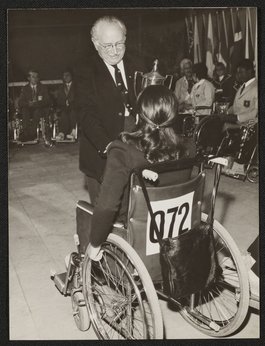
Sir Ludwig Guttmann, Wellcome Collection. Reference: PP/GUT/A.9/4. CC.BY License.
Recognition
Guttmann’s work at the spinal unit was recognised with an OBE in 1950 and a Knighthood in 1966. He was elected a Fellow of the Royal Society in 1976.
He passed away in 1980 at the age of 80. Guttmann's obituary published in the British Medical Journal wrote he 'was loved by and will be remembered by paralysed patients; not only his own patients but others throughout the world who understand what he has done for them'.
In recognition of the origins of the Paralympics at Stoke Mandeville Hospital, the Paralympic mascot at the London 2012 Paralympics was named Mandeville.
